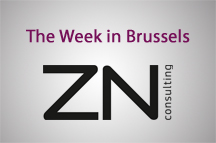 May 2018 will never have the resonance of May ’68, but there is something in the air. And not just the surprise of millennials at seeing in documentaries that Danny Cohn-Bendit and some of his contemporaries was once just like them. Nor is it French students blocking exams or rail workers trying the patience of travellers around the hexagone. It’s that, just a year away from the European Parliament elections, the idea that the election of Macron in France is definite proof that Europe is back is starting to look increasingly shaky.
May 2018 will never have the resonance of May ’68, but there is something in the air. And not just the surprise of millennials at seeing in documentaries that Danny Cohn-Bendit and some of his contemporaries was once just like them. Nor is it French students blocking exams or rail workers trying the patience of travellers around the hexagone. It’s that, just a year away from the European Parliament elections, the idea that the election of Macron in France is definite proof that Europe is back is starting to look increasingly shaky.
The week started with what could be a metaphor: Ryan Heath being stranded in Italy by Brussels Airlines, where despite declaring on Tuesday that their Monday plans to blow up the eurozone were already out of date, by Wednesday the League/M5S coalition were accusing investors of trying to “blackmail” them. Here we go again? Forget the march of the robots, but keep an eye on those mini-BoTs: Google them, along with bond spreads.
On the bright side, Greece and Macedonia said on Thursday they had made further progress towards resolving their decades-old naming dispute, which at least eases that pain in the Balkans.
 Meanwhile, on Wednesday, Europe’s Donald, who is getting increasingly active on all things social (check out his Instagram stories) went for his US counterpart on Twitter: “with friends like that who needs enemies?”. But some might argue that at least Trump brings a degree of unity to the European family. And, to echo Juncker attacking “part-time Europeans” among mainstream politicians last weekend in Florence, he may as well be asking, “with friends like these, who needs populists?”.
Meanwhile, on Wednesday, Europe’s Donald, who is getting increasingly active on all things social (check out his Instagram stories) went for his US counterpart on Twitter: “with friends like that who needs enemies?”. But some might argue that at least Trump brings a degree of unity to the European family. And, to echo Juncker attacking “part-time Europeans” among mainstream politicians last weekend in Florence, he may as well be asking, “with friends like these, who needs populists?”.
Well, populists do offer an example of how to campaign effectively on social media and drive the conversation in the direction you want – or rather the one you don’t want in this case. So, here’s looking at you, full-time Europeans: if you want to make the story of Europe resonate, you need to use the same methods (though you will need to do this without all the #fakenews and Russian backing).
Populists leverage the fact that negative, aggressive and emotional messages can be more shareable on social media than positive and reasonable ones. You need to counter this by defending European values with emotion and colour, taking a pioneering and experimental attitude to communicating using digital tools.
If we want to make sure the next election is not dominated by anti-everything, we need a paradigm shift with new thinking, a new mindset and a new approach. We want to be able to tell the story of Europe with passion and confidence. Check out #DiscoverEU to see what I mean. And let’s make Europe great again – one tweet at a time!














